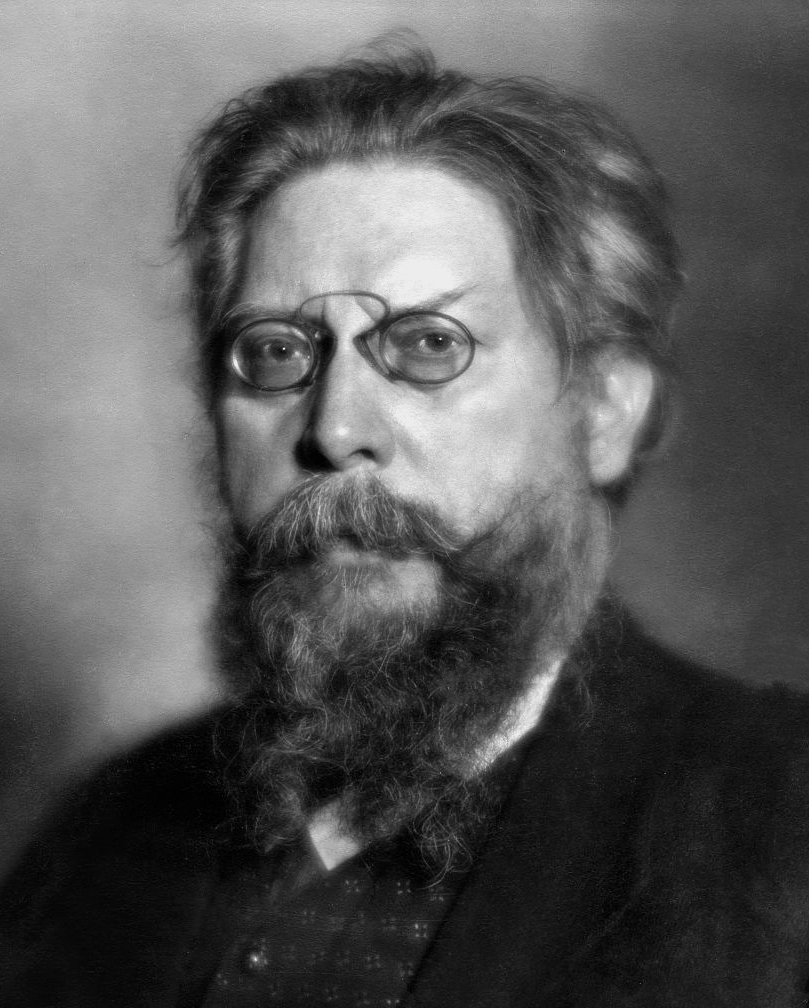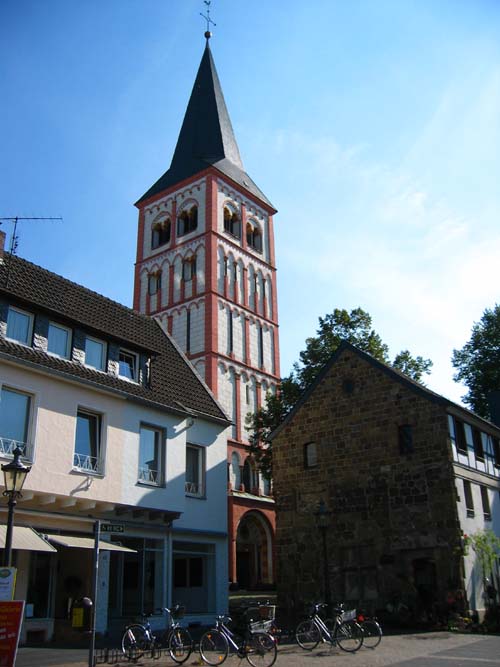|
Bruno Wille
Bruno Wille (6 February 186031 August 1928) was a German politician, writer and journalist. He was born in Magdeburg, and died in Aeschach near Lindau. He tried to make an end to the collective ideology of the Social Democratic Party of Germany (SPD) from 1890 until 1892. Influenced by Friedrich Nietzsche, he wanted to end the tyranny of political parties and protect individuality. He considered that politics should help develop a personality and not subdue it. He was the leader of the radical youth opposition of the SPD. He did not have much support and had to leave the party in 1892. From that moment onwards, he regarded himself as an anarchist. In 1896 he published an account of his visits to Joseph Dietzgen in Siegburg, in which he speaks of the philosopher with great respect. He moved away from his anarchist viewpoint: Instead of complete egotism, egoism, he became an advocate of harmony of a community of humans. He became a great admirer of nature and wanted to become one ... [...More Info...] [...Related Items...] OR: [Wikipedia] [Google] [Baidu] |
Bruno Wille By Nicola Perscheid C1900
Bruno may refer to: People and fictional characters *Bruno (name), including lists of people and fictional characters with either the given name or surname * Bruno, Duke of Saxony (died 880) * Bruno the Great (925–965), Archbishop of Cologne, Duke of Lotharingia and saint * Bruno (bishop of Verden) (920–976), German Roman Catholic bishop * Pope Gregory V (c. 972–999), born Bruno of Carinthia * Bruno of Querfurt (c. 974–1009), Christian missionary bishop, martyr and saint * Bruno of Augsburg (c. 992–1029), Bishop of Augsburg * Bruno (bishop of Würzburg) (1005–1045), German Roman Catholic bishop * Pope Leo IX (1002–1054), born Bruno of Egisheim-Dagsburg * Bruno II (1024–1057), Frisian count or margrave * Bruno the Saxon (fl. 2nd half of the 11th century), historian * Saint Bruno of Cologne (d. 1101), founder of the Carthusians * Bruno (bishop of Segni) (c. 1045–1123), Italian Roman Catholic bishop and saint * Bruno (archbishop of Trier) (died 1124), German Roman ... [...More Info...] [...Related Items...] OR: [Wikipedia] [Google] [Baidu] |
Egotism
Egotism is defined as the drive to maintain and enhance favorable views of oneself and generally features an inflated opinion of one's personal features and importance distinguished by a person's amplified vision of one's self and self-importance. It often includes intellectual, physical, social, and other overestimations. The egotist has an overwhelming sense of the centrality of the "me" regarding their personal qualities. Characteristics Egotism is closely related to an egocentric love for one's imagined self or narcissism – indeed some would say "by egotism we may envisage a kind of socialized narcissism". Egotists have a strong tendency to talk about themselves in a self-promoting fashion, and they may well be arrogant and boastful with a grandiose sense of their own importance. Their inability to recognise the accomplishments of others leaves them profoundly self-promoting; while sensitivity to criticism may lead, on the egotist's part, to narcissistic rage at a se ... [...More Info...] [...Related Items...] OR: [Wikipedia] [Google] [Baidu] |
German Anarchists
German(s) may refer to: * Germany (of or related to) **Germania (historical use) * Germans, citizens of Germany, people of German ancestry, or native speakers of the German language ** For citizens of Germany, see also German nationality law **Germanic peoples (Roman times) * German language **any of the Germanic languages * German cuisine, traditional foods of Germany People * German (given name) * German (surname) * Germán, a Spanish name Places * German (parish), Isle of Man * German, Albania, or Gërmej * German, Bulgaria * German, Iran * German, North Macedonia * German, New York, U.S. * Agios Germanos, Greece Other uses * German (mythology), a South Slavic mythological being * Germans (band), a Canadian rock band * "German" (song), a 2019 song by No Money Enterprise * ''The German'', a 2008 short film * "The Germans", an episode of ''Fawlty Towers'' * ''The German'', a nickname for Congolese rebel André Kisase Ngandu See also * Germanic (other) * Germa ... [...More Info...] [...Related Items...] OR: [Wikipedia] [Google] [Baidu] |
German Religious Humanists
German(s) may refer to: * Germany (of or related to) **Germania (historical use) * Germans, citizens of Germany, people of German ancestry, or native speakers of the German language ** For citizens of Germany, see also German nationality law **Germanic peoples (Roman times) * German language **any of the Germanic languages * German cuisine, traditional foods of Germany People * German (given name) * German (surname) * Germán, a Spanish name Places * German (parish), Isle of Man * German, Albania, or Gërmej * German, Bulgaria * German, Iran * German, North Macedonia * German, New York, U.S. * Agios Germanos, Greece Other uses * German (mythology), a South Slavic mythological being * Germans (band), a Canadian rock band * German (song), "German" (song), a 2019 song by No Money Enterprise * ''The German'', a 2008 short film * "The Germans", an episode of ''Fawlty Towers'' * ''The German'', a nickname for Congolese rebel André Kisase Ngandu See also * Germanic (disambi ... [...More Info...] [...Related Items...] OR: [Wikipedia] [Google] [Baidu] |
Politicians From Magdeburg
A politician is a person active in party politics, or a person holding or seeking an elected office in government. Politicians propose, support, reject and create laws that govern the land and by an extension of its people. Broadly speaking, a politician can be anyone who seeks to achieve political power in a government. Identity Politicians are people who are politically active, especially in party politics. Political positions range from local governments to state governments to federal governments to international governments. All ''government leaders'' are considered politicians. Media and rhetoric Politicians are known for their rhetoric, as in speeches or campaign advertisements. They are especially known for using common themes that allow them to develop their political positions in terms familiar to the voters. Politicians of necessity become expert users of the media. Politicians in the 19th century made heavy use of newspapers, magazines, and pamphlets, as well a ... [...More Info...] [...Related Items...] OR: [Wikipedia] [Google] [Baidu] |
1928 Deaths
Nineteen or 19 may refer to: * 19 (number), the natural number following 18 and preceding 20 * one of the years 19 BC, AD 19, 1919, 2019 Films * ''19'' (film), a 2001 Japanese film * ''Nineteen'' (film), a 1987 science fiction film Music * 19 (band), a Japanese pop music duo Albums * ''19'' (Adele album), 2008 * ''19'', a 2003 album by Alsou * ''19'', a 2006 album by Evan Yo * ''19'', a 2018 album by MHD * ''19'', one half of the double album ''63/19'' by Kool A.D. * ''Number Nineteen'', a 1971 album by American jazz pianist Mal Waldron * ''XIX'' (EP), a 2019 EP by 1the9 Songs * "19" (song), a 1985 song by British musician Paul Hardcastle. * "Nineteen", a song by Bad4Good from the 1992 album '' Refugee'' * "Nineteen", a song by Karma to Burn from the 2001 album ''Almost Heathen''. * "Nineteen" (song), a 2007 song by American singer Billy Ray Cyrus. * "Nineteen", a song by Tegan and Sara from the 2007 album '' The Con''. * "XIX" (song), a 2014 song by Slipk ... [...More Info...] [...Related Items...] OR: [Wikipedia] [Google] [Baidu] |
1860 Births
Year 186 ( CLXXXVI) was a common year starting on Saturday (link will display the full calendar) of the Julian calendar. At the time, it was known as the Year of the Consulship of Aurelius and Glabrio (or, less frequently, year 939 ''Ab urbe condita''). The denomination 186 for this year has been used since the early medieval period, when the Anno Domini calendar era became the prevalent method in Europe for naming years. Events By place Roman Empire * Peasants in Gaul stage an anti-tax uprising under Maternus. * Roman governor Pertinax escapes an assassination attempt, by British usurpers. New Zealand * The Hatepe volcanic eruption extends Lake Taupō and makes skies red across the world. However, recent radiocarbon dating by R. Sparks has put the date at 233 AD ± 13 (95% confidence). Births * Ma Liang, Chinese official of the Shu Han state (d. 222) Deaths * April 21 – Apollonius the Apologist, Christian martyr * Bian Zhang, Chinese official and ... [...More Info...] [...Related Items...] OR: [Wikipedia] [Google] [Baidu] |
Bruno Bauer
Bruno Bauer (; 6 September 180913 April 1882) was a German philosopher and theologian. As a student of G. W. F. Hegel, Bauer was a radical Rationalism, Rationalist in philosophy, politics and Biblical criticism. Bauer investigated the sources of the New Testament and, beginning with Hegel's Hellenophile orientation, concluded that early Christianity owed more to Ancient Greece, ancient Greek philosophy (Stoicism) than to Judaism. Bruno Bauer is also known for his association and sharp break with Karl Marx and Friedrich Engels, and by his later association with Max Stirner and Friedrich Nietzsche. Starting in 1840, he began a series of works arguing that Jesus, Jesus of Nazareth was a 2nd-century fusion of Jewish, Greek, and Roman theology.Will Durant, Durant, Will. Caesar and Christ. New York: Simon and Schuster. 1972 Biography Bauer was the son of a painter in a porcelain factory and his wife at Eisenberg, Thuringia, Eisenberg in Saxe-Gotha-Altenburg. He studied at the Humbol ... [...More Info...] [...Related Items...] OR: [Wikipedia] [Google] [Baidu] |
Christ Myth Theory
The Christ myth theory, also known as the Jesus myth theory, Jesus mythicism, or the Jesus ahistoricity theory, is the view that "the story of Jesus is a piece of mythology", possessing no "substantial claims to historical fact". Alternatively, in terms given by Bart Ehrman paraphrasing Earl Doherty, "the historical Jesus did not exist. Or if he did, he had virtually nothing to do with the founding of Christianity." In contrast, the mainstream scholarly consensus holds that Jesus was a historical figure who lived in 1st-century Roman Judea, and that he was baptized and was crucified. Beyond that, mainstream scholars have no consensus about the historicity of the other major details of the gospel stories, or on the extent to which the Pauline epistles and the gospels replaced the historical human Jesus with a religious narrative of a supernatural "Christ of faith". Mythicism "goes back to Enlightenment times, when the historical-critical study of the past was born," and wa ... [...More Info...] [...Related Items...] OR: [Wikipedia] [Google] [Baidu] |
Die Neue Zeit
''Die Neue Zeit'' (German: "The New Times") was a German socialist theoretical journal of the Social Democratic Party of Germany (SPD) that was published from 1883 to 1923. Its headquarters was in Stuttgart, Germany. History and profile Founded by leading socialist politicians and theorists, the magazine's first edition was released on 1 January 1883. After the abolition of the Anti-Socialist Laws, the magazine was transformed from a monthly into a weekly on 1 October 1890. In 1901 it became the official magazine of the SPD and its property. The magazine's decline and end came with the hyperinflation of the 1920s. It became the most important organ of the SPD, competing with '' Sozialistische Monatshefte''. It was edited by Karl Kautsky and Emanuel Wurm until their withdrawal from the SPD in 1917. Following that, Heinrich Cunow took over as its chief editor. ''Die Neue Zeit'' was succeeded by ', of which the first issue was published on 1 April 1924. Austrian socialist theore ... [...More Info...] [...Related Items...] OR: [Wikipedia] [Google] [Baidu] |
Magdeburg
Magdeburg (; nds, label=Low Saxon, Meideborg ) is the capital and second-largest city of the German state Saxony-Anhalt. The city is situated at the Elbe river. Otto I, the first Holy Roman Emperor and founder of the Archdiocese of Magdeburg, was buried in the city's cathedral after his death. Magdeburg's version of German town law, known as Magdeburg rights, spread throughout Central and Eastern Europe. In the Late Middle Ages, Magdeburg was one of the largest and most prosperous German cities and a notable member of the Hanseatic League. One of the most notable people from the city is Otto von Guericke, famous for his experiments with the Magdeburg hemispheres. Magdeburg has been destroyed twice in its history. The Catholic League sacked Magdeburg in 1631, resulting in the death of 25,000 non-combatants, the largest loss of the Thirty Years' War. During the World War II the Allies bombed the city in 1945 and destroying much of it. After World War II the city belonged t ... [...More Info...] [...Related Items...] OR: [Wikipedia] [Google] [Baidu] |
Siegburg
Siegburg (i.e. ''fort on the Sieg river''; Ripuarian: ''Sieburch'') is a city in the district of Rhein-Sieg-Kreis in North Rhine-Westphalia, Germany. It is located on the banks of the rivers Sieg and Agger, 10 kilometres from the former seat of West German government Bonn and 26 kilometres from Cologne. The population of the city was 39,192 in the 2013 census. Geography Siegburg is located approximately 8 kilometres east of the river Rhine, at the confluence where the Agger joins the Sieg, in the southeast corner of the Cologne Lowland. Neighbouring towns include Troisdorf, Lohmar, Sankt Augustin and Hennef. The nearby cities of Cologne and Bonn are easily accessible through good transport links. The highest point of the urban area is 220m above sea level ( NHN) in the Braschoß area and the lowest point is just under 54m above sea level at the mouth of the Agger. History Archbishop-Elector Anno II of Cologne founded a Benedictine monastery in 1064, known as Michaelsberg ... [...More Info...] [...Related Items...] OR: [Wikipedia] [Google] [Baidu] |




